Thousands of international students choose to pursue higher education in the Netherlands and Ireland each year. It is not surprising, because these nations are home to some of the most prestigious and prominent universities in the world. It can become daunting to choose between these two countries for pursuing higher education as both of them are known for offering world-class education and a wide range of career opportunities. But you can put all your confusion aside as we will put an end to the Netherlands vs. Ireland debate in this blog. We will evaluate both countries and finally conclude which one is the best study-abroad destination.
| Parameters | Netherlands | Ireland |
| Area | 41,850 KM² | 84,421 KM² |
| Currency | Euro (€) | Euro (€) |
| Capital | Amsterdam | Dublin |
| Total Higher Education Providers | 145 | 22 |
| Total Indian Students Studying | 55 | 4,000 |
| Average Cost of Living | €800 – €1000 Per Month | €1,000 – €1,500 Per Month |
| Average Cost of Studying | €6,000 – €20,000 Per Year | €12,000 Per Annum |
| Popular Job Sectors | IT professional, Engineering jobs, Finance sector, and Healthcare jobs. | Technology, Accounting and Finance, Construction, Creative Design, Web Development, Nursing, and Business Skills. |
| Permitted Part-Time Working Hours | 16 Hours Per Week | Up To 40 Hours Per Week During Holidays and 20 hours Per Week During the School Year |
This Blog Includes:
Top Universities: Netherlands vs Ireland
Choosing the right university is a stepping stone to a bright career. We have provided below a list of list of best universities in the Netherlands and Ireland. We will conclude which country is home to the best universities towards the end of this section. The nation with the higher-ranked universities will be awarded +2 points in this section.
Universities in the Netherlands
Have a look at some of the best universities in the Netherlands:
Universities in Ireland
The table below provides a list of top universities in Ireland:
| Top Universities in the Ireland |
| Trinity College Dublin, The University of Dublin |
| University College Dublin |
| University of Galway |
| University College Cork |
| Dublin City University |
| University of Limerick |
| Maynooth University |
Which Country is Better?
The tables above demonstrate that universities in the Netherlands hold a higher rank in comparison to Ireland. Hence, we will grant a score of +2 to the Netherlands in this round of our Netherlands vs. Ireland contest.
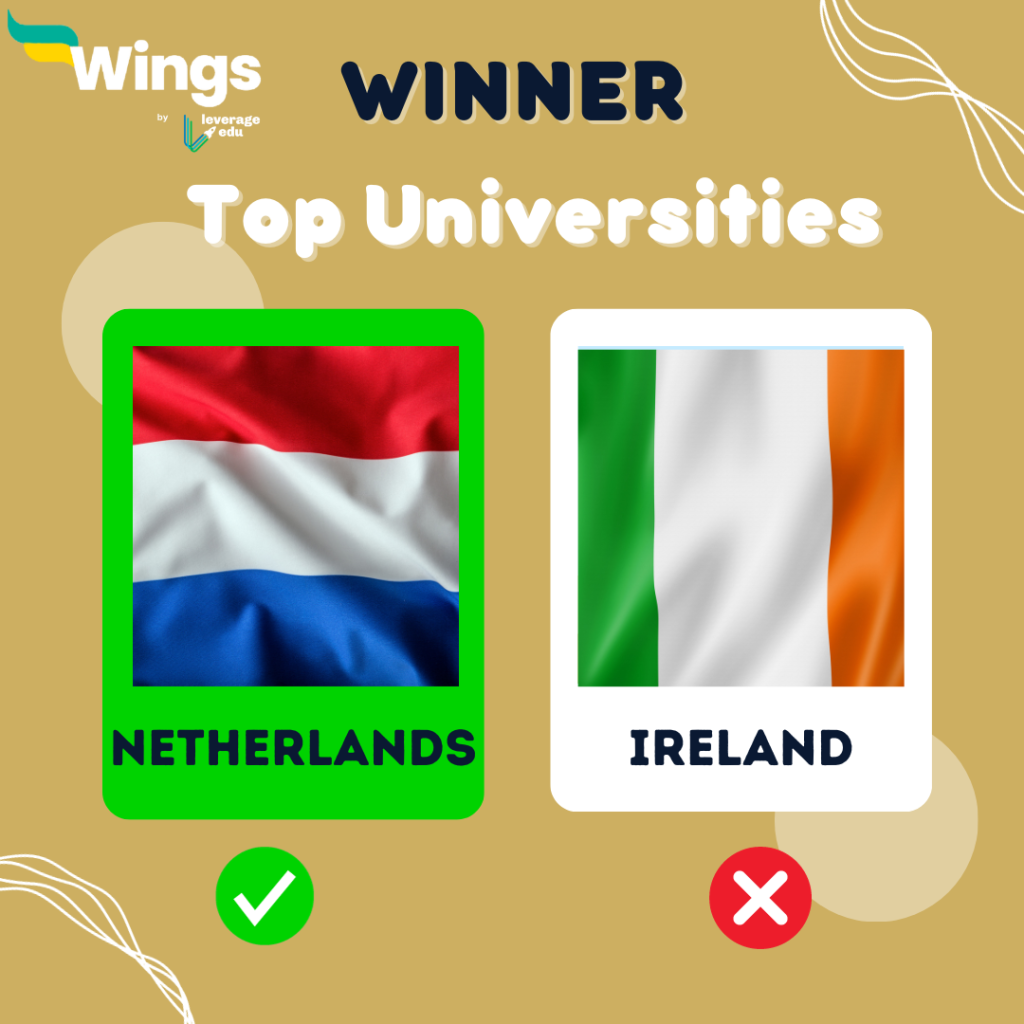
Also Read: Part-Time Job Opportunities In Netherlands
Admission Requirements
You need to carefully assess the criteria for both the Netherlands and Ireland before you embark on pursuing education in any of these countries. In this section, we will understand the eligibility criteria for gaining admission to the universities in each country.
Admission Requirements For Netherlands
If you want to gain admission to the universities in the Netherlands, you have to provide the documents listed below:
- GMAT (minimum 550) or GRE (minimum 310 to 330) score,
- Mark sheets of Class 10, 12, and the bachelor’s degree (if applicable),
- TOEFL results (at least 550 for paper-based or 213 for internet-based) or IELTS (minimum score of 6),
- Results of Dutch language test Staatsexamen NT2 only for enrolment for programs in Dutch,
- The student must score a minimum of 75% in class 12,
- Two letters of recommendation (LOR) from the employer/manager (if you have work experience),
- Motivation Letter,
- Proof of funds,
- Resume,
- Portfolio (in case of students applying for art and design courses or architecture programs),
- Others (Certificates/achievements at the state and national level and extracurricular activities),
- A copy of your passport, and
- Health insurance.
Admission Requirements For Ireland
The following are the criteria for attending Irish universities:
- Applicants need to have a current passport.
- A minimum IELTS score of 6.0 is needed, as is a TOEFL iBT score of 90, a PTE score of 36 (UG), a PTE score of 63 (PG), and a Cambridge ESOL score of C1 or C2.
- Students are required to have a medical insurance policy of at least €25,000.
- The applicants are also required to provide proof of sufficient funds.
- You must additionally provide specific documents, such as:
- A letter from a college confirming your acceptance
- Two passport pictures
- Receipt as verification of registration and payment of tuition fees
- Additional university-specific requirements
Which Country is Better?
As we can see, admission requirements for Indian students are generally easier in Ireland compared to the Netherlands. As a result, in this round of our Netherlands vs. Ireland contest, we will give Ireland +2 points.
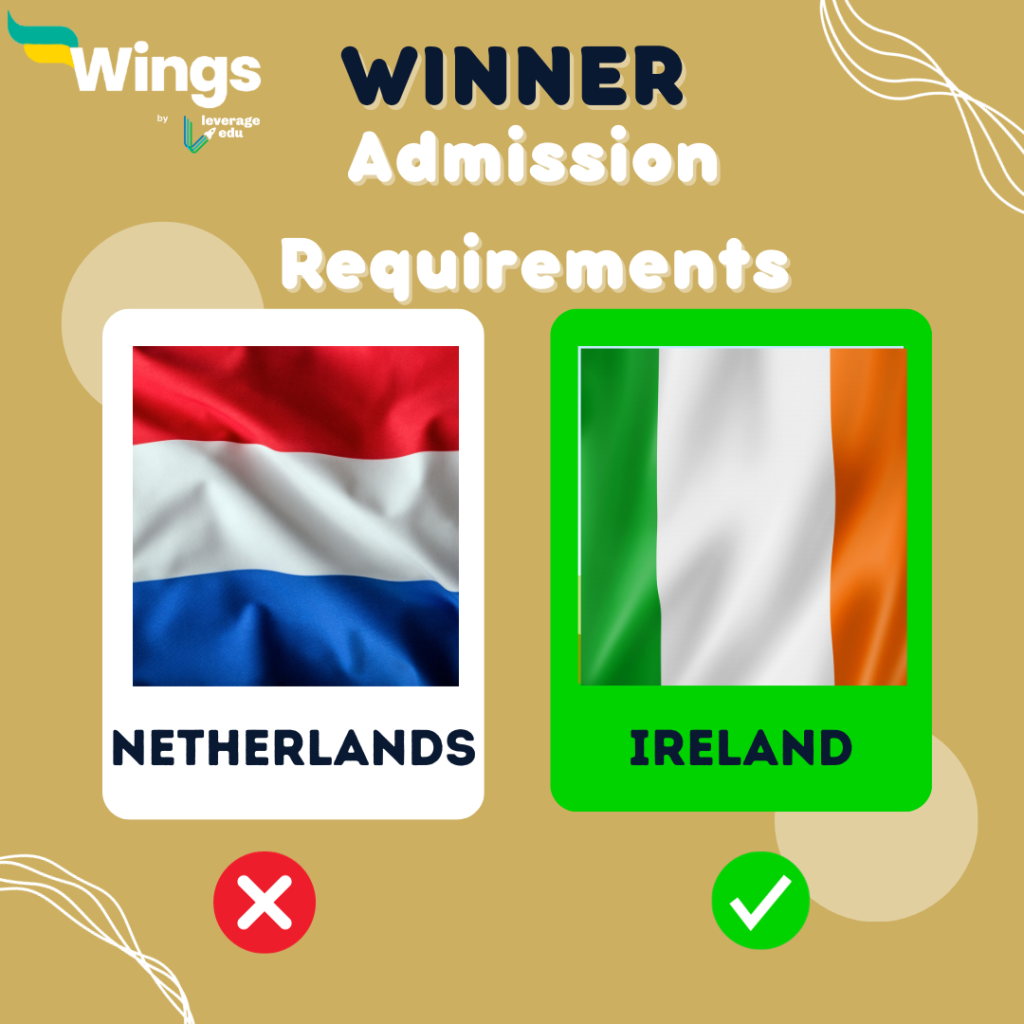
Also Read: List of MBA Scholarships in the Netherlands
Tuition Fees Structure
We will see which country has the lowest cost of education. The country with the lowest cost of education will be granted a score of +2 points. So, let’s understand the tuition fee structure in the Netherlands and Ireland.
Tuition Fees in the Netherlands
The average annual tuition fees in the Netherlands as per the website of the universities in the nation are listed in the table provided below:
| Study Program | Average Annual Tuition Fee |
| Undergraduate | €6,000 – €15,000 |
| Postgraduate | €8,000 – €20,000 |
| Doctoral | €6,000 – €20,000 |
Tuition Fees in Ireland
The average annual tuition fees in Ireland as per the website of the universities in the country are listed in the table provided below:
| Study Program | Average Annual Tuition Fee |
| Undergraduate | €9,000 to €26,000 |
| Postgraduate | €9,000 to €35,000 |
| Doctoral | €9,000 to €40,000 |
Which Country is Better?
The tables above demonstrate that the tuition fees in the Netherlands are lower than in Ireland. As a result, the Netherlands will receive a +2 score in this section of our Netherlands vs. Ireland contest.
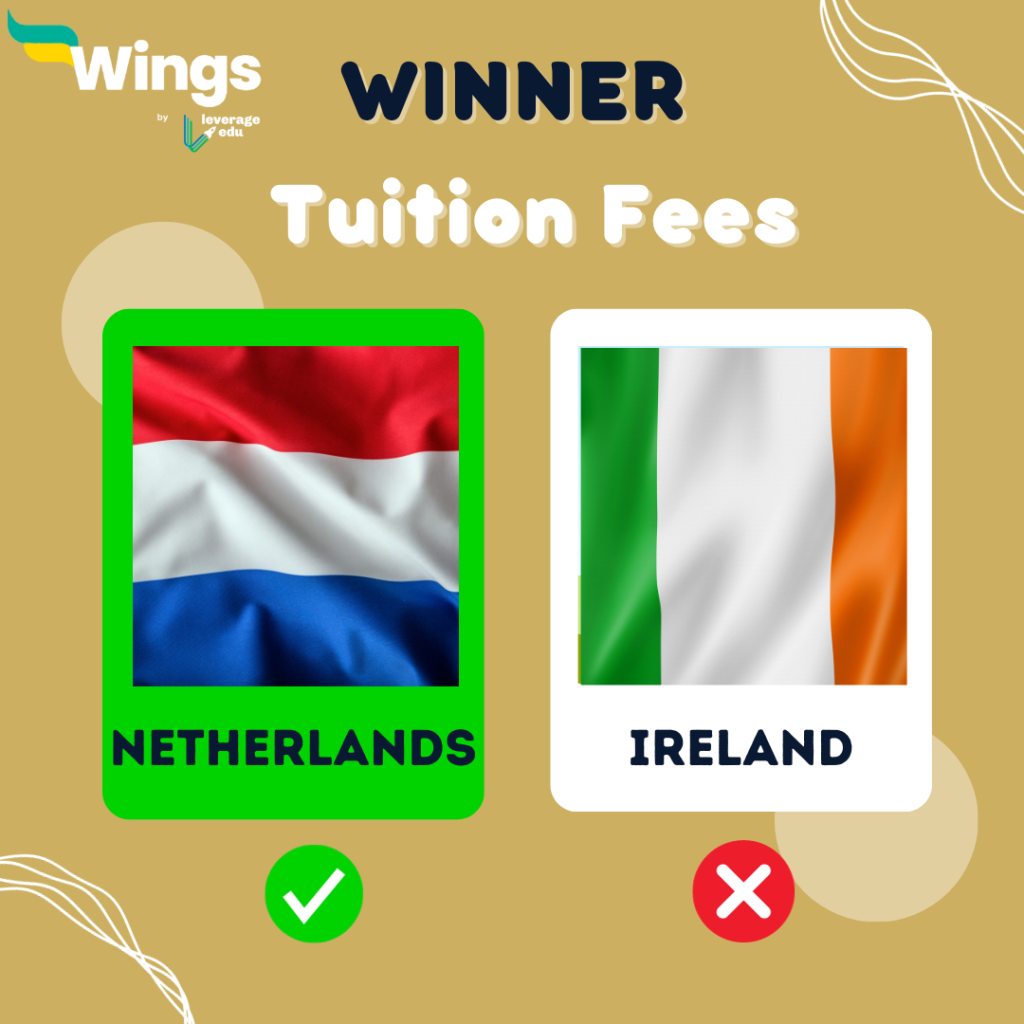
Also Read: PhD in the Netherlands
Living Expenses
It is crucial to understand the cost of living in your destination country well in advance before you go there to pursue education. In this section, we will compare the cost of living in the Netherlands to that in Ireland.
Cost of Living in the Netherlands
According to Numbeo’s website, the cost of living in the Netherlands is as follows:
| Monthly Rent | €967.26 – €1,817.26 |
| Average Apartment Price (Price per Square Metre) | €3,669.49 – €5,044.22 |
| Average Cost of an Inexpensive Restaurant Meal | €15 |
| Average Transportation Cost (Monthly) | €80.95 |
| Average Cost of Utility (Monthly) | €277.51 |
Cost of Living in Ireland
According to Numbeo’s website, the cost of living in Ireland is as follows:
| Monthly Rent | €1,240.15 – €2,483.62 |
| Average Apartment Price (Price per Square Metre) | €3,454 – €4,765.23 |
| Average Cost of an Inexpensive Restaurant Meal | €15 |
| Average Transportation Cost (Monthly) | €100 |
| Average Cost of Utility (Monthly) | €276.21 |
Which Country is Better?
Living expenses for Indian students can vary, but they are generally lower in Ireland compared to the Netherlands. Hence, Ireland will be granted +2 points in this round of our Netherlands vs. Ireland contest.
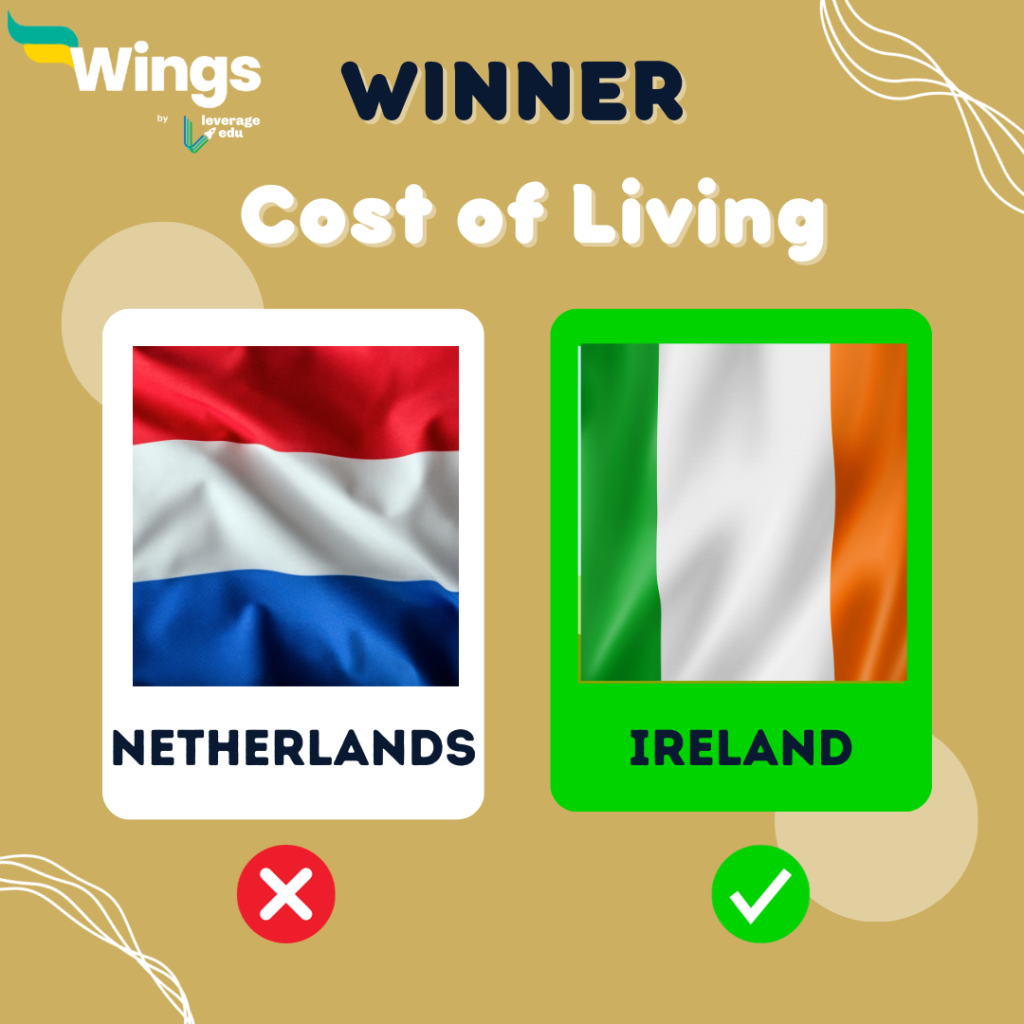
Also Read: Chemical Engineering in Australia: Salary, Jobs, Courses, Companies
Work Permit and PR
Students often pursue education abroad to find employment and obtain permanent residency. Let’s see the easiness of obtaining a work visa and permanent residency in the Netherlands and Ireland.
Work Permit in the Netherlands
In the Netherlands, a work permit is granted as follows:
Eligibility Criteria for a Work Permit in the Netherlands:
- You need to possess a valid employment contract with a Dutch employer.
- If you are an employee over the age of 23, you have to earn at least the minimum wage.
- Your employer has to demonstrate that the post could not be filled by a Dutch or other EU/EEA national.
Apply for a Work Permit in the Netherlands:
You need to apply for a visa in person at the Dutch mission, embassy, or consulate in your nation of residence. In case it’s not possible, you can contact a Dutch mission in another country. The processing time for a work permit in the Netherlands can range anywhere from 2 weeks to 90 days.
PR in the Netherlands
Non-EEA residents who have stayed in the Netherlands for over 5 years can apply for permanent residence in the Netherlands.
Work Permit in Ireland
Let’s understand how a work permit is given in Ireland:
Eligibility for a Work Permit in Ireland
Students have to meet the criteria listed below to receive a work permit in Ireland.
- The candidates need to be hired temporarily. They might also receive a bid from an Irish company.
- The company has to clear the Labour Markets Needs Test in case the applicant is applying for a work visa (other than a Critical Skills Employment visa).
- This test implies that the Irish-descent employer was not able to fill the vacant position with a qualified Irish or EU/EEA/Swiss citizen.
- To become eligible for a Critical Skills Employment Permit, candidates have to earn at least €30,000 or €80,000 per year. This is decided by the kind of work they seek.
- Applicants for General Work Permits need to have a minimum yearly salary of €30,000.
- The minimum annual wage has to meet the National Minimum Wage, except for the Critical Skills Employment Permit and the General Employment Permit.
- The Irish-based company that hires the work visa applicant needs to employ at least 50% of its personnel from the EU, EEA, or Switzerland.
Steps to Apply for a Work Permit in Ireland
First of all, identify which type of work permit you wish to apply for. After figuring out the required work permit, the applicant has to complete the associated application form. Applicants have to be patient while they wait for an update on the status of their work visa in Ireland.
The work permit for Ireland takes about 13 weeks to process. You are able to check the status of your work visa for Ireland on the DBEI website, You can pick up your visa after it has been accepted.
PR in Ireland
In case you are a non-EEA national who has been legally living in Ireland for the last 5 years and has a work permit, you are most likely to be eligible for permanent residence in Ireland.
Which Country is Better?
Obtaining a Permanent Residency (PR) can be easier in the Netherlands compared to Ireland, but specific requirements and processes can vary based on individual circumstances and immigration policies. Hence, the Netherlands receives +2 points in this section of our Netherlands vs. Ireland contest.
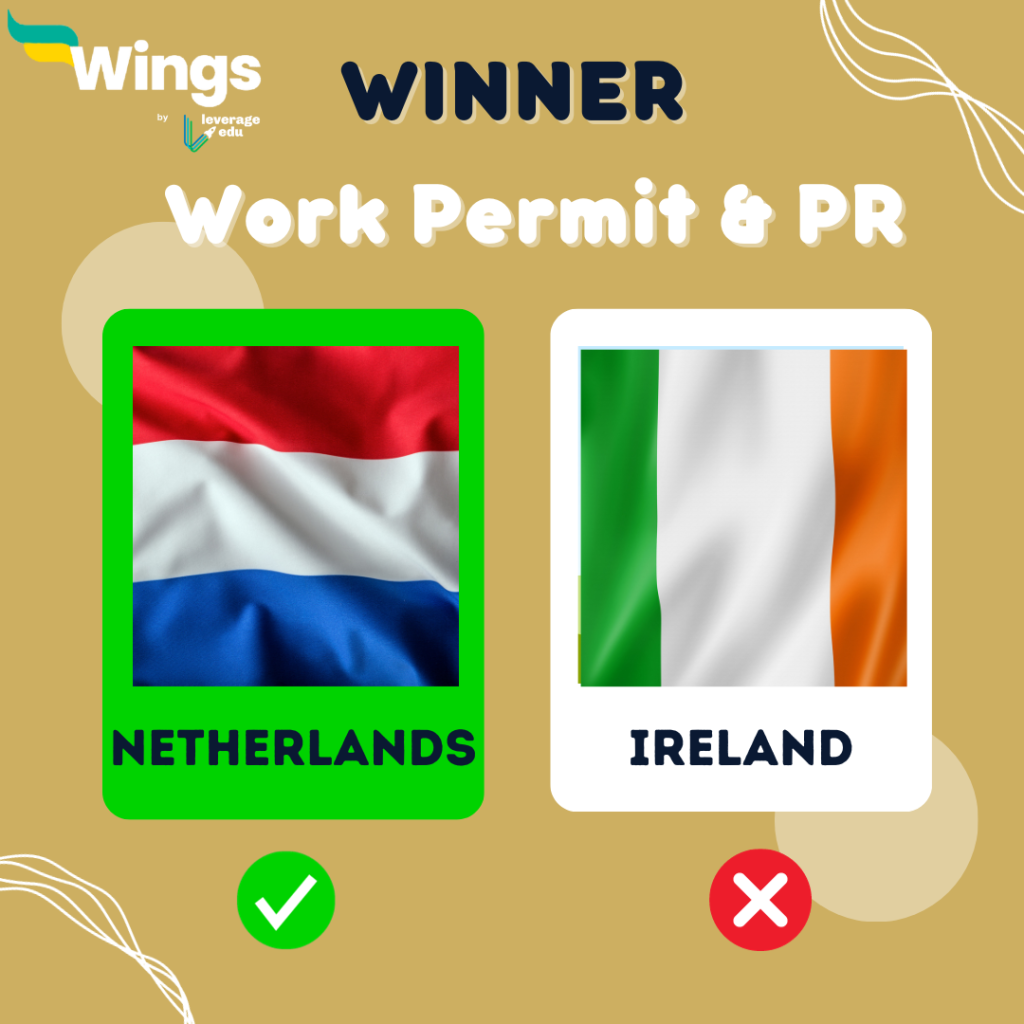
Also Read: How To Choose The Right Study Abroad Destination
Average Salaries: Netherlands vs. Ireland
The average annual salary after graduation is €46,665 in the Netherlands, according to WeAreDevelopers. On the other hand, it is around €56,870 after postgraduation, as per Glassdoor. In Ireland, the average salary after graduation is €33,383 to €50,000 per year, whereas it is €65,000 per year after postgraduation.
Which Country is Better?
As we can see from the above comparison, salary in Ireland is higher than in the Netherlands. Hence, Ireland will be given +2 points in this round of the Netherlands vs. Ireland.
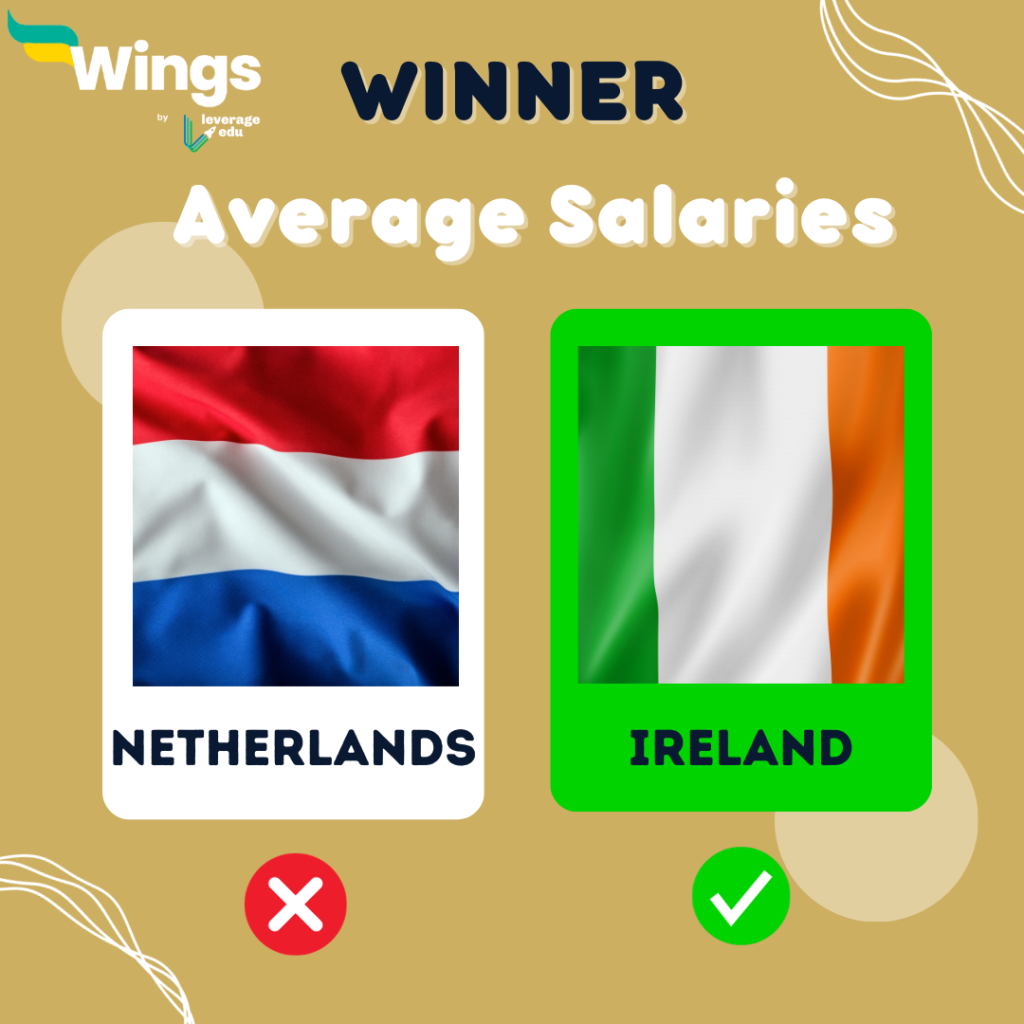
Also Read: Best Countries to Study Abroad
Other Major Elements
Now, let’s dive into some other important considerations one must keep in mind while choosing a study-abroad destination. So, here are some of these important factors:
Climate
The Netherlands has a mild maritime climate. This kind of climate is distinguished by chilly summers and warm winters. The country doesn’t have any dry season, and precipitation is common throughout the year. In the case of Ireland, its climate is greatly impacted by the Atlantic Ocean. So, the warm ocean currents keep the temperatures temperate in the country.
Safety
The Netherlands is typically regarded as a very safe nation. Crimes such as narcotics, murder, and other forms of human hostility are exceedingly rare in the country. Ireland is also known to be a very safe country for international students. But it is important to take caution and follow the local guidelines and suggestions.
Culture for International Students
The Netherlands is renowned for its openness to international students. The country’s culture is very diverse, and the Dutch people are known for their kindness and warmth. On the other hand, Ireland is famous for its thriving cultural traditions, magnificent castles, rich history, and breathtaking scenery.
Also Read: Best Universities in Ireland
Conclusion
When the overall scores of the Netherlands and Ireland are computed, we discover that the Netherlands and Ireland both obtained 6 points. As a result, its a tie!
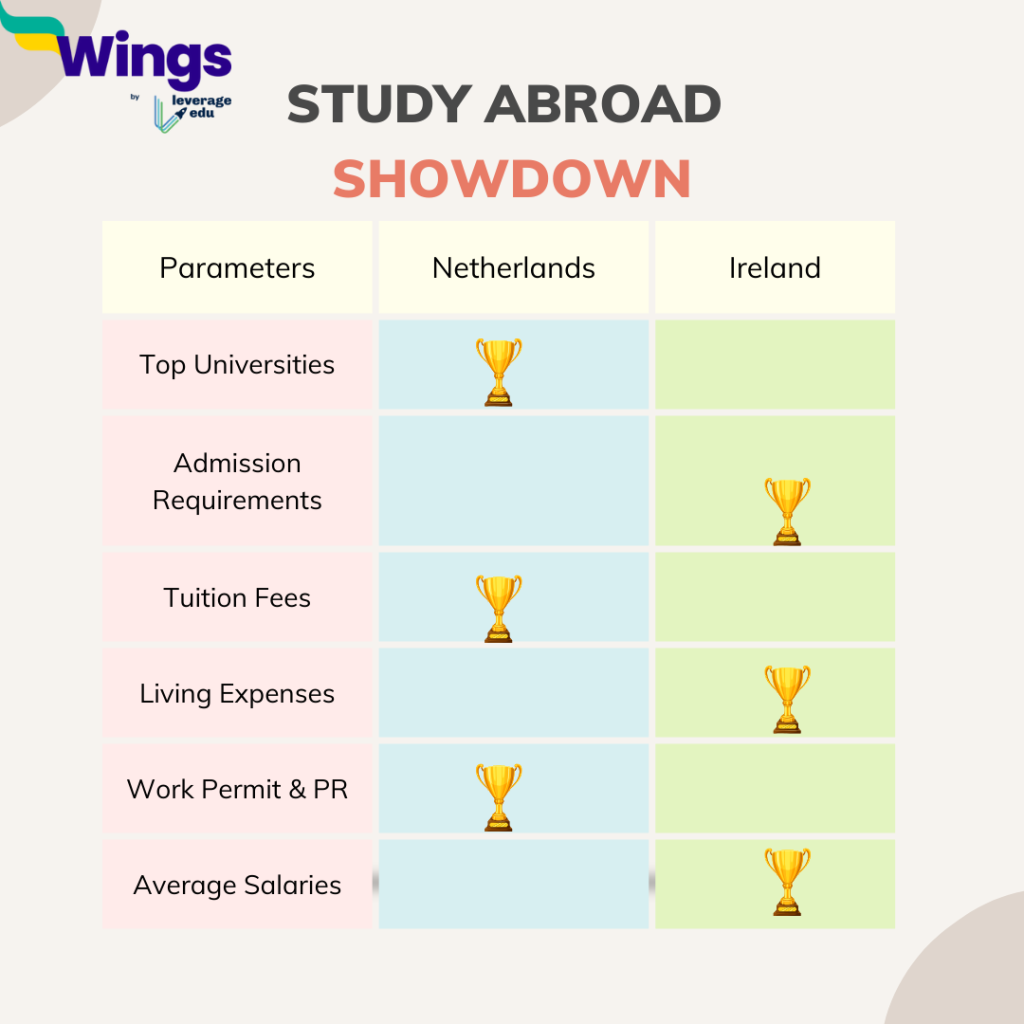
It is really important, however, to recognise that both the Netherlands and Ireland have merits and demerits. It is recommended that you select a degree or field of study before applying to any country’s universities. Evaluate the facilities for education and financial aid available for the degree of your choice to make a better-informed decision. Nonetheless, both the Netherlands and Ireland are excellent study-abroad destinations.
Also Read: MBA in Ireland
FAQs
Ans. Yes, Ireland is an excellent place for overseas students. It has a world-class education system with renowned universities and ample opportunities for employment.
Ans. Overall living is expensive in the Netherlands when compared to Ireland.
Ans. The Netherlands is blessed with resources like natural gas, the North Sea, and rich soil for farming. The country’s soil is ideal for cattle breeding and agriculture. The nation produces large volumes of fruit, cheese, and vegetables.
Ans: Both countries offer post-study work opportunities, but the specifics of permits and eligibility vary. It is wise to research the current visa requirements of each individual country. Each country has regulations for post study work.
Ans: The cost of living in Ireland, especially in major cities like Dublin, tends to be higher than in the Netherlands. Although the netherlands is becoming more costly to reside in.
RELATED BLOGS
| Netherlands vs. New Zealand | Ireland vs New Zealand |
| Public Universities in Ireland | Germany vs Ireland |
| Cost of Living in Ireland | Student Life in Ireland |
| Top 10 Reasons to Study in Ireland | Germany vs Ireland |
So, this was all about the Netherlands vs. Ireland. Many Indian students dream of pursuing education in foreign nations due to the exposure and career growth they offer. Consider joining a free counselling session with Leverage Edu if you plan to study abroad.


 One app for all your study abroad needs
One app for all your study abroad needs











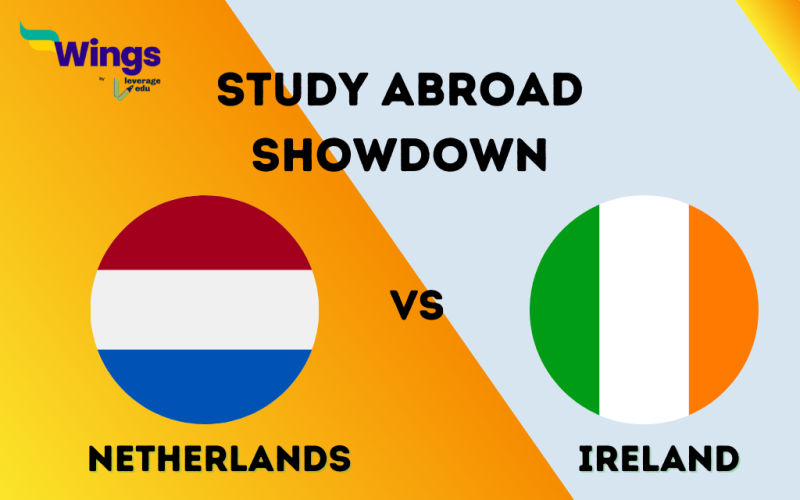
 60,000+ students trusted us with their dreams. Take the first step today!
60,000+ students trusted us with their dreams. Take the first step today!